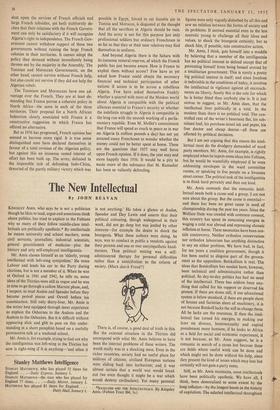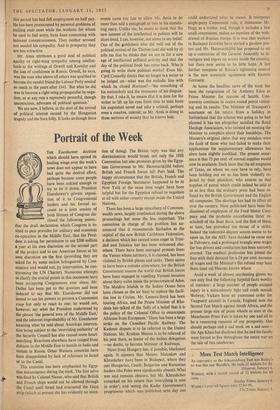The New Intellectual
By JOHN BEAVAN KINGSLEY AMIS, who says he is not a politician though he likes to read, argue and sometimes think about politics, has tried to explain to the Fabians why so many of their fellow middle-class intel- lectuals are politically apathetic.* By intellectuals he means university and school teachers, some civil servants, journalists, industrial scientists, general practitioners of medicineāplus the literary and arty self-employed intelligentsia.
Mr. Amis classes himself as an 'elderly, young intellectual with left-wing sympathies.' He votes Labour and lends his car to the Party during elections, but is not a member of it. When he was at Oxford in 1941 and 1942, he tells us, some ideas of the Thirties were still in vogue and he was in time to go through a callow Marxist phase, and, I suspect, to read Auden and Spender before they became period pieces and Orwell before his canonisation. Still only thirty-four, Mr. Amis is the writer best equipped through inner experience to explain the Osbornes to the Audens and the Audens to the Osbornes. But it is difficult without appearing slick and glib to pass on this under- standing in a short pamphlet based on a usefully provocative talk at a weekend school.
Mr. Amis is, for example, trying to find out why the intelligentsia was left-wing in the Thirties but now is right-wing if it is anythingā`and often it is not anything.' He takes a glance at Auden, Spender and Day Lewis and asserts that their political colouring, though widespread in their work, did not go deep but was jostled by other interestsāfor example the desire to shock the bourgeois. What these authors were doing, he says, was to conduct in public a vendetta against their parents and one or two unsympathetic head- masters. Thus political writing was a self- administered therapy for personal difficulties rather than a contribution to the reform of society. (Marx lurch Freud?) There is, of course, a good deal of truth in this. But the external situation in the Thirties did correspond with what Mr. Amis believes to have been the internal problems of these writers. The world really was in a shocking mess. Even in the richer countries, society had no useful place for millions of citizens; civilised European nations were sliding back into barbarism; and it was almost certain that a world war would break out (we even thought it might be a war which would destroy civilisation). Yet many parental *SOCIALISM AND THE INTELLECTUALS. By Kingsley Amis. (Fabian Tract 304, Is.) figures were only vaguely disturbed by all this and saw no relation between the forms of society and its. problems. It seemed essential even to the less neurotic young to challenge all their ideas and values, to shock the bourgeois certainly, but to shock him, if possible, into constructive action.
Mr. Amis, I think, gets himself into a muddle by believing that a member of the intelligentsia has no political interest to defend except that of preventing himself from being bossed around by a totalitarian government. This is surely a pretty big political interest in itself; and since freedom is indivisible in the conditions of today, it involves the intellectual in vigilance against all encroach- ments on liberty. Surely this is the role for which he is better fitted than anybody else is. It is just untrue to suggest, as Mr. Amis does, that the intellectual lives politically in a void. In the modern State there is no political void. The con- trolled rent of the writer's basement flat, his sub- sidised loaf, his purchase-taxed ink and paper, his free doctor and cheap dentistāall these are affected by political decisions.
But I am not arguing that this means the intel- lectual must do the drudgery demanded of ward party members. Mr. Amis, for example, is rightly employed when he injects some ideas into Fabians, but he would be wastefully employed if he were addressing envelopes in the ward committee rooms, or speaking to five people on a Swansea street corner. The political task of the intelligentsia is to think hard privately and then out loud.
Mr. Amis contends that the romantic intel- lectual needs both a cause and a group. I am not sure about the group. But the cause is essentialā and there has been no great cause in need of championship during the past ten years. Since the Welfare State was created with common consent, this country has spent its remaining energies in waging a cold war abroad and repressing chronic inflation at home. These necessities have been out- side controversy. Neither orthodox conservatism nor orthodox labourism has anything distinctive to say on either problem. We have had, in fact, for ten years a coalition government, though it has been useful to disguise part of the govern- ment as the opposition. Butskellism is real. The ideas that Butskellism has needed have, however, been technical and administrative rather than political. So day-to-day politics has had no need of the intellectual. There has seldom been any- thing that called for his support or deserved his protest. If there are slums still, if our educational system is below standard, if there are people short of houses and factories short of machinery, it is not because Butskell lacks the will to change them. All he lacks are the resources. If then the intel- lectual has turned his energies to making our laws on divorce, homosexuality and capital punishment more humane, if he looks to Africa as a field for social and economic experiment, it is not because, as Mr. Amis suggests, he is a romantic in search of a cause but because these are fields where useful work can be done and which might not be done without his help, since they present the kind of issues which may lose but certainly will not gain a party votes.
Still, as Mr. Amis maintains, most intellectuals have been politically apathetic. We have all, I think, been demoralised to some extent by the long inflationāby the longest boom in the history of capitalism. The salaried intellectual throughout this period has had full employment on half pay. He has been preoccupied by personal problems of making ends meet while the workers, for whom he used to feel sorry, have been consuming with indecent conspicuousness. They neither aroused nor needed his sympathy. And in prosperity they are less attractive.
Mr. Amis attributes a good deal of political apathy or right-wing sympathy among intellec- tuals to the writings of Orwell and Koestler and the loss of confidence in Russia. Orwell, he says, was the man who above all others was qualified to become the candid friend the Labour Party needed so much in the years after 1945. 'But what he did was to become a right-wing propagandist by nega- tion, or at any rate a supremely powerful, though unconscious, advocate of political quietism.'
We are now, I believe, at the start of the revival of political interest caused by the Hungarian tragedy and the Suez folly. It looks as though these events came too late to allow Mr. Antis to do more than add a paragraph or two to his stimula- ting essay. Unlike me, he seems to think that the new interest of the intellectual in politics will be short-lived. I am, however, not alone in my belief. One of the iiublishers who did well out of the political revival of the Thirties (and did well by it) tells me that he thinks that we are in for a new age of intellectual political activity and that the day of the political book has conic back. Who is going to write these political works? Even Mr. Cyril Connolly thinks that no longer is a writer to be judged onāwhat was the melodic line with which he closed Horizon?ā`the something of his melancholy and the resonance of his despair.' By that, I take it, he means that it is time for the writer to lift up his eyes from time to time from his anguished navel and take a critical, perhaps even a creative, interest, as Mr. Antis is doing in those sections of society that he knows best.



































 Previous page
Previous page